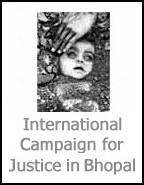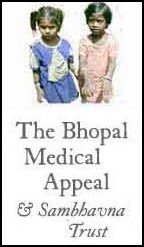International Forum
on Bhopal, Pesticides, and Corporate Responsibility From April 7-9, 2005, Young Volunteers for the Environment of Togo, Africa, the biggest-ever youth environmental organization in the sub region, organized a successful Forum that memorialized Bhopal in Kpémé, Togo. The event included conferences and debates on pesticides, public meetings, video presentation on the Bhopal tragedy and other cultural activities (theatre play). The population of the host city, Kpémé, suffers from the impoverishing of the land left behind from phosphate mines exploitation – they were also given the opportunity to have their voice heard and show their solidarity with the Bhopal victims during the event.
"Where were you since? You should have came long time ago, now we are all dead alike those you picture in the powerpoint diapositive" - that was the first impression of an authority from Kpeme. The Forum gathered around 70 national and international participants from JVE and numerous NGOs, as well as school children, villagers, school teachers, workers from the plant, media and churches. The chief of the village gave us the honour of attending the opening and closing ceremonies; authorities from the prefecture also visited the first while the police were represented at the latter. Our challenge was to find a way to show the link between the Bhopal tragedy and the case of Kpémé in a way that could touch everyone who was present. We wanted the people of the village who are bearing the burden of the impacts of the phosphate exploitation and the participants who have conducted preparatory studies on the use of pesticides and social injustice in their home countries, to see why a tragedy of the past still needs our attention. The morale behind Bhopal was communicated to participants and the people of the village through discourses, a theatre play (Bhopal 20 Years Later by Misty Seemans) and an expressive photo slide show presenting the story of Kpémé and Bhopal. Even if the photos where showing children of Kpémé with smiling faces, the public was raged to see the damaged teeth behind their smiles. Most touching though, was seeing school children showing their support to the children of Bhopal by: - reading poems; On the closing ceremony of the Night of Bhopal, it was very touching to see children entering the stage each one with a letter which in total read: 'Justice pour Bhopal' (justice for Bhopal).
Other notable points included: - attendance at times reached 700
This symbolises the solidarity between two poverty-affected communities locating industrial plants where the greed to make huge financial income happens at the detriment of security, social and environmental impacts. The participants leave Kpémé after a forum discussing a wide range of themes such as the environmental impacts from use of pesticides, the implementation of ISO norms for businesses, the importance of impact studies, sustainable and biological agriculture, the society of consumption, conventions related to pesticides... After each workshop, a very deep debate followed with experiences and inputs from different countries. Representatives from Togo, Ghana, Burkina Faso, Benin, Nigeria, Niger, Liberia, Guinea, Ivory Coast also presented a report on the situation in their home countries. Generally speaking the absence of a functional institutional and juridical framework is an obstacle to effective implementation of, for instance, the Stockholm and the Rotterdam conventions, which have been ratified by the governments. Several examples were presented during the session of presentation of the national reports. For instance the Liberian delegation focused on the use of the pesticide DDT used to fight insects vectoring harmful diseases. DDT is feared for its harmful effects on human health and for its hazardous effects on soil and water. However, compared to the consequences of malaria, the side effects of DDT are considered to be less destructive as malaria is the most deadly tropical sickness. To conclude, the representative drew attention to the need for developed countries to assist developing countries like Liberia as a case of reference to fight tropical diseases by alternative means. Examples from Ghana stressed the danger of overuse and unsafe storage of pesticides, and the need of ensuring the implementation of the appropriate laws. Further, case studies from Niger show a terrible example on how fluoride contamination of the drinking water has resulted in severe malformations of infants, while the Niger Government ignores their responsibility. Picture of children handicapped forever touched every participant. Oil spillage in rivers in the Niger delta ruins the local communities where fishing is the main source of living. Another issue of social justice problematic was given through the report from the Ivory Coast, where civil war has resulted in huge environmental damages, among others a reduced diversity of the local fauna and flora. Populations were forced to leave their lands and once back lost all their living conditions.
We intend to follow up this through campaigns and lobbying coordinated by the International Network that was created during the forum. The main goal is to share common resources and exchange ideas, and in addition all the network partners should take action in the local campaigns (petitions, appeals to governments,..) which each national branch is in charge of as a part of the follow-up. Depending on the appropriate funding, the network will be capable to conduct case studies and launch campaigns urging governments and business to take action and raising public awareness on environmental and development issues. The case of Kpeme can be the first in a long list of cases that can be brought in front of international tribunals. All the participants and functionaries are now heading back to their local groups, but they are not leaving Kpémé without a trace. A painted graffiti (a memorial) on the wall at the front gate of the school is a reminder of the tragedy in Bhopal, while dozens of young tree plants will symbolize the start of the fight for social rights in Kpémé. In addition we believe that each of the participants return back sharing the same impressions - a sympathy with the victims of the catastrophe of the past and a motivation for forthcoming activities and campaigns in their respective home countries. Our greatest thanks go to Student for Bhopal for its full support (especially Ryan B), Pesticide Action Network (particularly Diana Ruiz), PAN Africa, GGF, The School of Kpeme, the local Kpeme authorities, all the media and the Minister of Interior and Security of Togo. The fight has just started... Earth Day Conference & Solidarity On April 22, 2006, JVE organized a day-long series JVE also collected signatures for a petition in support of the Bhopalis’ “March to Delhi” demands, to present to the Indian Consulate in Togo. “When it was requested for interested ones to sign our petition, for the indian consulate, the reaction was incredible! Almost all of them expressed sympathy and wanted to know more, to the point that our normal schedule was disturbed.” More than 200 people signed the petition to support the Bhopalis’ demands. Several JVE members and attendees also observed a one-day hunger strike in solidarity with the Bhopalis, who had broken their six-day hunger strike in Delhi only a few days before. This attracted some media attention, including television coverage. Petitioning the Indian Consul in Togo On
General Assembly and TV Special Edition Young Volunteers for the Environment
of Togo, Africa, the biggest-ever youth organization in the sub
region, aired several Bhopal documentaries as a part of its weekly
TV program, and also highlighted the campaign for justice in Bhopal
at its general assembly in December 2004, and in interviews with
the media. "We had a wonderful event. The best demonstration was during our YVE general assembly. The event gathered about 150 youths from all over the country and from neighbouring countries such as Burkina Faso, Benin, Ghana, Nigeria, and even France. The media were very interested about our insistence on discussing historical tragedies such as Bhopal. They all received copy of my speech and many made good use of them. I started with a powerful sentence: 'We are confused and outraged'. Then I continued with the whole story about Bhopal. The whole room was silent as I explained how things happened and how unjust the victims were treated." The Executive Director forgot no problem of the current world in
his powerful address, that impressed all the participants. 'We are
outraged', he started. Recalling the tragedy (explosion) of the
pesticide industrial plant of Union Carbide in Bhopal (dec 1984),
India, he expressed his feelings regarding the lethargy that most
of the authorities are displaying nowadays. 'Otherwise, why can
you explain that victims of that tragedy that killed hundreds of
innocents has never been recognised by Union Carbide and survivors
are left to their lot without any medical support nor financial
resource.' "Well, we are happy to support Bhopal! In the interview I explained how the whole stuff happened and what can be done. In the coming days, I will be presenting the Bhopal case in various radio programs and newspapers. In my TV Program, we are organising on next Wednesday a special edition on Bhopal. The Togolese Committee on the Management of POPs (Stockholm Convention) will be my guest to discuss the morale behind Bhopal and the impact of Pesticide in Togo."
|
The international student campaign to hold Dow
accountable for Bhopal, and its other toxic legacies around the world.
For more information about the campaign, or for problems regarding this
website, contact Ryan
Bodanyi, the Coordinator of Students for Bhopal.
WE
ALL LIVE  IN
BHOPAL
IN
BHOPAL
"The year 2003 was a special year in the history of the campaign for justice in Bhopal. It was the year when student and youth supporters from at least 30 campuses in the US and India took action against Dow Chemical or in support of the demands of the Bhopal survivors. As we enter the 20th year of the unfolding Bhopal disaster, we can, with your support, convey to Dow Chemical that the fight for justice in Bhopal is getting stronger and will continue till justice is done. We look forward to your continued support and good wishes, and hope that our joint struggle will pave the way for a just world free of the abuse of corporate power."
Signed/ Rasheeda Bi, Champa Devi Shukla
Bhopal Gas Affected Women Stationery Employees Union
International Campaign for Justice in Bhopal
This is what the www.studentsforbhopal.org site looked like in early 2008. For more recent information, please visit www.bhopal.net.









 of
Bhopal presentations as part of a larger conference focusing on
environmental challenges. “I was thrilled by the reaction
we got on Earth Day,” Sena writes from Togo. “The whole
day, we discussed about Bhopal and how to prevent such disasters.
All this was in the presence of the Director of Environment, the
Resident Representative of UNIDO (United Nations Industrial Development
Organisation) and several University Professors and NGOs.”
More than 30 journalists, 20 biology teachers, and several youth
associations also attended.
of
Bhopal presentations as part of a larger conference focusing on
environmental challenges. “I was thrilled by the reaction
we got on Earth Day,” Sena writes from Togo. “The whole
day, we discussed about Bhopal and how to prevent such disasters.
All this was in the presence of the Director of Environment, the
Resident Representative of UNIDO (United Nations Industrial Development
Organisation) and several University Professors and NGOs.”
More than 30 journalists, 20 biology teachers, and several youth
associations also attended.  June
7, 2006, JVE organized an action to mark World Environment Day and
show their continuing support and solidarity for the Bhopal cause
by presenting more than 500 petition signatures to the Indian Consul
in Togo, demanding that the Indian Government follow through on
their commitments from the ‘March to Delhi’. About two
dozen JVE supporters participated in the action, dressed in Bhopal
t-shirts to demonstrate their solidarity. The supporters also met
with the Togolese Deputy Minister for the Environment, who expressed
concern over the continuing disaster and his own support for the
campaign for justice. The event was covered prominently in the local
media.
June
7, 2006, JVE organized an action to mark World Environment Day and
show their continuing support and solidarity for the Bhopal cause
by presenting more than 500 petition signatures to the Indian Consul
in Togo, demanding that the Indian Government follow through on
their commitments from the ‘March to Delhi’. About two
dozen JVE supporters participated in the action, dressed in Bhopal
t-shirts to demonstrate their solidarity. The supporters also met
with the Togolese Deputy Minister for the Environment, who expressed
concern over the continuing disaster and his own support for the
campaign for justice. The event was covered prominently in the local
media.

 He
called upon government to stop the unjust world system powered by
the World Trade Organisation.
He
called upon government to stop the unjust world system powered by
the World Trade Organisation.